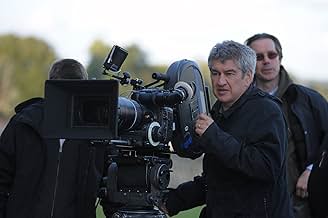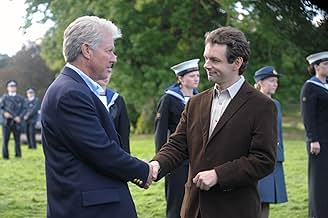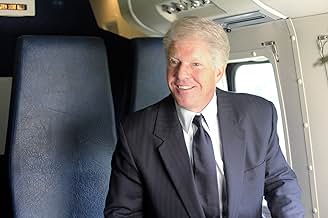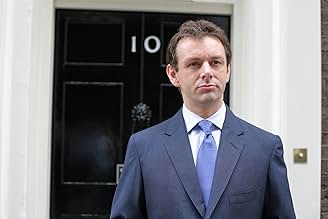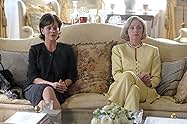NOTE IMDb
6,7/10
5,2 k
MA NOTE
Ajouter une intrigue dans votre langueA dramatization that traces former UK prime minister Tony Blair's relationships with Bill Clinton and George W. Bush.A dramatization that traces former UK prime minister Tony Blair's relationships with Bill Clinton and George W. Bush.A dramatization that traces former UK prime minister Tony Blair's relationships with Bill Clinton and George W. Bush.
- Réalisation
- Scénario
- Casting principal
- Nommé pour 5 Primetime Emmys
- 1 victoire et 26 nominations au total
Gerry Adams
- Self
- (images d'archives)
- (non crédité)
Peter Agnelli
- Air port worker
- (non crédité)
Madeleine Albright
- Self
- (images d'archives)
- (non crédité)
Avis à la une
The movie starts with Tony Blair (Michael Sheen) coming over to America to learn from their experiences and try to reinvigorate the Labour Party. He develops a close relationship with Bill Clinton (Dennis Quaid). Then the relationships get more complex, and the movie ends with a press briefing from the real George W and Blair.
The movie is looking at this mostly from the point of view of Tony Blair. He starts off as an almost giddy schoolboy in awe of the great Bill Clinton. Michael Sheen is the best thing in this movie. He is probably the best person for the role. His superior acting skills is on full display. Dennis Quaid is not as good. He comes off as mimicking the president. Hope Davis is quite effective as Hillary. It's a pretty good recitation of the Clinton-Blair years concentrating on Northern Ireland, Lewinsky, and Kosovo from a 90 minutes HBO TV movie.
The movie is looking at this mostly from the point of view of Tony Blair. He starts off as an almost giddy schoolboy in awe of the great Bill Clinton. Michael Sheen is the best thing in this movie. He is probably the best person for the role. His superior acting skills is on full display. Dennis Quaid is not as good. He comes off as mimicking the president. Hope Davis is quite effective as Hillary. It's a pretty good recitation of the Clinton-Blair years concentrating on Northern Ireland, Lewinsky, and Kosovo from a 90 minutes HBO TV movie.
Following the "secret" story of his election (The Deal) and his first major crisis (The Queen), writer Peter Morgan ends his unofficial Tony Blair trilogy with one of the most famous aspects of the man's political career: his friendship with US President Bill Clinton, and the hopes and problems that came with it.
The film, made as a co-production between BBC and HBO (where it premiered in May 2010, though it has been picked up for theatrical release in other countries), starts in slightly familiar territory, showing us Blair (played, once again, by Michael Sheen) before he was elected, and the same goes for Clinton (Dennis Quaid), who immediately befriends the British politician on the grounds that they have a lot in common: young (politically speaking), ambitious and eager to make a difference in their respective governments. Once both men are in office, the cooperation goes very smoothly, prompting the media - and the two friends themselves - to talk about a "special relationship" between America and Great Britain. However, like most relationships, it has to face some hard times, most notably the conflict in the former Jugoslavia and, on a more private front, the Lewinsky scandal, which drives a wedge between Bill and Hillary (Leslie Hope) and Tony and Cherie (Helen McCrory, reprising her role from The Queen).
Like most of Morgan's work, The Special Relationship puts a lot of emphasis on character and performance, especially Sheen who, by now, wears Blair's clothes and mannerisms like they were a second skin, a fact that becomes more evident when archive footage is used to show the man's first encounter with a very different Commander in Chief (one George W. Bush), and he's ably assisted by the excellent Quaid who, having already played a President in American Dreamz, gets past the not-so-perfect physical resemblance between himself and the real Clinton to deliver a fully formed portrayal of a flawed, but very charismatic individual. On the female side, Hope is the usual guarantee of quality, while McCrory is a bit of a revelation, taking advantage of the increase in screen-time she has been granted compared to The Queen.
That said, the film is probably the least dramatically poignant of the trilogy. Maybe it has to do with the change in the director's chair (goodbye Stephen Frears, hello Richard Loncraine), but the real reason is the excessive familiarity of the material: whereas The Deal and The Queen dealt with the unseen (and largely fictionalized) side of their respective stories, The Special Relationship centers around a piece of Anglo-American history that has been widely covered multiple times, meaning there's very little on screen, no matter how entertaining, that people haven't heard of before.
Overall, a slightly underwhelming but consistently amusing look at the workings of English and US politics, propelled by a flawless double act and some Aaron Sorkin-like writing. If this is the last we'll see of Michael Sheen as Tony Blair, one thing is clear: it's been a very pleasant experience.
7,5/10
The film, made as a co-production between BBC and HBO (where it premiered in May 2010, though it has been picked up for theatrical release in other countries), starts in slightly familiar territory, showing us Blair (played, once again, by Michael Sheen) before he was elected, and the same goes for Clinton (Dennis Quaid), who immediately befriends the British politician on the grounds that they have a lot in common: young (politically speaking), ambitious and eager to make a difference in their respective governments. Once both men are in office, the cooperation goes very smoothly, prompting the media - and the two friends themselves - to talk about a "special relationship" between America and Great Britain. However, like most relationships, it has to face some hard times, most notably the conflict in the former Jugoslavia and, on a more private front, the Lewinsky scandal, which drives a wedge between Bill and Hillary (Leslie Hope) and Tony and Cherie (Helen McCrory, reprising her role from The Queen).
Like most of Morgan's work, The Special Relationship puts a lot of emphasis on character and performance, especially Sheen who, by now, wears Blair's clothes and mannerisms like they were a second skin, a fact that becomes more evident when archive footage is used to show the man's first encounter with a very different Commander in Chief (one George W. Bush), and he's ably assisted by the excellent Quaid who, having already played a President in American Dreamz, gets past the not-so-perfect physical resemblance between himself and the real Clinton to deliver a fully formed portrayal of a flawed, but very charismatic individual. On the female side, Hope is the usual guarantee of quality, while McCrory is a bit of a revelation, taking advantage of the increase in screen-time she has been granted compared to The Queen.
That said, the film is probably the least dramatically poignant of the trilogy. Maybe it has to do with the change in the director's chair (goodbye Stephen Frears, hello Richard Loncraine), but the real reason is the excessive familiarity of the material: whereas The Deal and The Queen dealt with the unseen (and largely fictionalized) side of their respective stories, The Special Relationship centers around a piece of Anglo-American history that has been widely covered multiple times, meaning there's very little on screen, no matter how entertaining, that people haven't heard of before.
Overall, a slightly underwhelming but consistently amusing look at the workings of English and US politics, propelled by a flawless double act and some Aaron Sorkin-like writing. If this is the last we'll see of Michael Sheen as Tony Blair, one thing is clear: it's been a very pleasant experience.
7,5/10
So, as far as the film stands as a film, it is ok, decent acting, some nice shots all in all, a film.
Now, the reality of what happened is not portrayed here, Tony Blair seems to be the generic good guy just trying his best whereas in the real world the only reason these men aren't in prison for war crimes is because we would then have to openly admit that we invaded a country based on lies, which will never happen.
So if you can watch this as a work of fiction it becomes much better, but essentially just a film to stroke the ego's of war criminals to try and justify their actions.
Now, the reality of what happened is not portrayed here, Tony Blair seems to be the generic good guy just trying his best whereas in the real world the only reason these men aren't in prison for war crimes is because we would then have to openly admit that we invaded a country based on lies, which will never happen.
So if you can watch this as a work of fiction it becomes much better, but essentially just a film to stroke the ego's of war criminals to try and justify their actions.
The Special Relationship is a disappointing and shallow film about Tony Blair's relationship with two U.S. presidents. Blair is a conundrum and probably only his wife really knows what makes him tick. Peter Morgan has almost become Blair's official biographer in film, however his take on Blair seems superficial and simple-minded. Morgan's Blair is likable, charismatic, loyal and sincere. He's also a devoted family man and a Christian. In this film he is constantly trying to do the right thing and comes off like a cross between a soap-opera character and a secular saint. Most people in Britain wouldn't buy into this interpretation.
The men and women who become the leaders of countries are usually incredibly ambitious, manipulative and complicated. They often like Clinton and Kennedy have potentially self destructive appetites. Blair we are meant to believe is just like a suburban dad. I have always been somewhat cynical about Blair's motives. When I first came across him during an election campaign in 1983 he was a socialist who recommended nationalization and nuclear disarmament. He gradually moved to the right and around 2003 became a fully fledged neocon.
This film suggests that Blair was basically a good guy trying to help the oppressed peoples of the world. For most people in Britain he is someone who put the interests of the United States above those of his own country. Not surprisingly he is still popular in the US but at home he hasn't been forgiven for supporting the Iraq War and for claiming that Saddam had weapons of mass destruction. Blair left office with approval ratings in the mid-twenties and British newspaper columnists love to write negative articles about him. The big mystery is what motivated his course of action, until his liaison with Bush he was popular. Since his resignation in 2007 Blair has done well financially out of his unwavering support for US foreign policy. In Polanski's the Ghost Writer it is even suggested that Blair was working for the CIA. It's a mystery this film doesn't help solve. MI5 has gone on record to say that Saddam wasn't a threat to Britain in 2003.
The Special Relationship is a throw-back to the biopics of the 1940s when "great men" were viewed sympathetically. I am looking forward to someday watching a film about the real Tony Blair. He is a more interesting character than the portrait painted in this simple-minded rationalization.
The men and women who become the leaders of countries are usually incredibly ambitious, manipulative and complicated. They often like Clinton and Kennedy have potentially self destructive appetites. Blair we are meant to believe is just like a suburban dad. I have always been somewhat cynical about Blair's motives. When I first came across him during an election campaign in 1983 he was a socialist who recommended nationalization and nuclear disarmament. He gradually moved to the right and around 2003 became a fully fledged neocon.
This film suggests that Blair was basically a good guy trying to help the oppressed peoples of the world. For most people in Britain he is someone who put the interests of the United States above those of his own country. Not surprisingly he is still popular in the US but at home he hasn't been forgiven for supporting the Iraq War and for claiming that Saddam had weapons of mass destruction. Blair left office with approval ratings in the mid-twenties and British newspaper columnists love to write negative articles about him. The big mystery is what motivated his course of action, until his liaison with Bush he was popular. Since his resignation in 2007 Blair has done well financially out of his unwavering support for US foreign policy. In Polanski's the Ghost Writer it is even suggested that Blair was working for the CIA. It's a mystery this film doesn't help solve. MI5 has gone on record to say that Saddam wasn't a threat to Britain in 2003.
The Special Relationship is a throw-back to the biopics of the 1940s when "great men" were viewed sympathetically. I am looking forward to someday watching a film about the real Tony Blair. He is a more interesting character than the portrait painted in this simple-minded rationalization.
The main point of interest in "The Special Relationship" is in my opinion the changing status throughout the film of the strong friendship between Bill Clinton and Tony Blair. Ahead of his election Blair is portrayed as a fan of the US President, appreciating Clinton's advice and the fact that Bill has taken a great interest in his career. At the beginning they both appear to share a genuine mutual friendship whereas, as both their careers progress, the relationship does deeply change. The Special Relationship is a good dramatization of the America/Great Britain relationships during those very important years. However I had the impression that the film, though well acted and directed, would be more suitable for the TV rather than for the big screen. Overall it's about an insightful representation of UK/US relations, depicted through the exploration of a bromance and, more than everything, a glimpse of the real Tony Blair. Not unforgettable but a quality story for sure.
Le saviez-vous
- AnecdotesThe third time that Michael Sheen plays former Prime Minister Tony Blair. The other two movies in which he earlier appeared as Blair were The Queen (2006) and Le Deal (2003).
- GaffesWhen Tony Blair visits Washington in 1992, he is picked up from the airport in a 1998 Lincoln Town Car. Also visible in this scene is a 1995 Lincoln Town Car, two 1998 Ford Crown Victorias and a 1998 Mercury Grand Marquis.
- Citations
Bill Clinton: This Administration has been born in controversy, national shame and illegality, and it is my bet that that's the way they'll go out.
Meilleurs choix
Connectez-vous pour évaluer et suivre la liste de favoris afin de recevoir des recommandations personnalisées
Détails
- Date de sortie
- Pays d’origine
- Sites officiels
- Langues
- Aussi connu sous le nom de
- Untitled Peter Morgan Project
- Lieux de tournage
- Sociétés de production
- Voir plus de crédits d'entreprise sur IMDbPro
Box-office
- Montant brut mondial
- 550 789 $US
- Durée1 heure 33 minutes
- Couleur
- Mixage
- Rapport de forme
- 2.35 : 1
Contribuer à cette page
Suggérer une modification ou ajouter du contenu manquant

Lacune principale
By what name was The Special Relationship (2010) officially released in Canada in English?
Répondre
